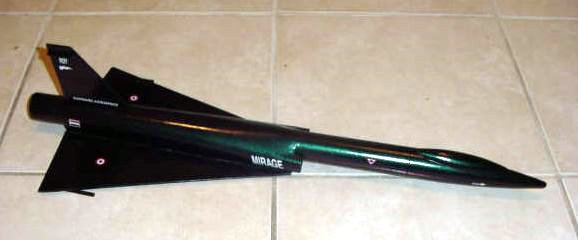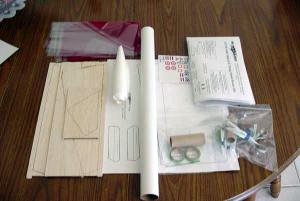| Construction Rating: | starstarstarstar_borderstar_border |
| Flight Rating: | starstarstarstarstar_border |
| Overall Rating: | starstarstarstarstar_border |
| Manufacturer: | Sunward Aerospace  |
Brief:
The Sunward Mirage is a model rocket with jet fighter styling. This model can
be built with either an 18mm or 24mm motor mount and uses an 18 inch parachute.
According to the manufacturer, flights to 600 feet are possible.


Construction:
The kit came in a plastic bag with header card and includes:
- 1 body tube
- 1 nose cone
- 4 launch lugs
- 2 motor mount kits (18mm or 24mm, your choice)
- 1 18mm tube for decorative intakes
- 1 paper shroud, shock cord mount and vertical fin reinforcement tab
- 1 18 inch parachute, shroud lines and tape disks
- 1 rubber shock cord
- 1 balsa fin sheet
- 1 decal sheet
This is a skill level 3 project so the builder is assumed to have previous building experience. I would only recommend this kit to builders that have built several kits already. Since Sunward is a Canadian company, the instructions are printed in English and French. The instructions were well written and had several illustrations and included the fin marking guide.
I started construction by assembling the 24mm motor mount as instructed. I recommend this option, and use an 18mm adaptor for 18mm motors. I then cut out the shroud and glued it together then glued it on to the body tube. My first attempt came out terrible so I sent an email to Angelo of Sunward, who sent me THREE replacement body tubes and shrouds. That is excellent customer service! For my second attempt, I used Aleene's Tacky glue. While the glue was drying, I carefully set a hardcover book on top of the assembly to hold the shroud in place. This attempt came out much better.
I fine sanded the balsa fin sheet then cut out both wings and vertical fin. I glued the wings to the shroud but getting them aligned was a bit tricky, so be prepared to take your time here. After the glue dried, I used more Aleene's to apply fillets to the wing/shroud joint. The instructions don't mention this but I highly recommend that you do this. The launch lug is glued into place and I also glued one lug to each wing as well.
Next, I took one of the 18mm tubes, cut it in half and glued each intake in place in the openings in the front of the shroud. I then streamlined the intake area.
I cut out the fin reinforcement tabs and glued them to the vertical fin and glued the fin into place. Then the final lug is cut in half and each piece is glued on both sides of the fin before rounding the leading edges of the wings and the vertical fin.
Now is the time to install the motor mount of your choice. I installed the 24mm motor mount and applied glue to the centering rings for strength. Since I was using the 24mm mount, I decided to add some nose weight. I added enough clay to fill the cavity up to the canopy molded into the nose cone.
Finally, I assembled the shock cord mount and installed it into the body tube and put the parachute together.
PROs: Builds fast, great quality components.
CONs: I found the shroud rather tough and a bit frustrating to work with as it took me two attempts to get something I could be pleased with.
Finishing:
I started the finishing by sanding the model smooth then sprayed the model with
Duplicolor gray primer and sanded between coats. I decided to paint the model
with the purple/green Duplicolor Mirage paint kit that I bought at my local
auto part store for about $20.It is a 3 step process of starting by applying
the black base coat, then the Mirage paint, and finally the clear coat. Then I
applied the decals. Although this is a peel and stick decal sheet, the decals
are not pre-cut and must be cut out prior to being applied to the model.
PROs: Easy to finish.
CONs: None.
Construction Rating: 3 out of 5
Flight:
The recommended 18mm motors for this kit are B6-2, B6-4, C5-3 (OOP), C6-3, and
C6-5. The recommended 24mm motors for this kit are D12-3, D12-5, and D12-7.
This kit does require recovery wadding and the motor hook holds the motor in
place.
For my first flight, I differed a bit from the motor recommendations and used a C11-5. Although the C11s are not on the list of recommended 24mm motors, it turned out to be an excellent motor for this rocket.
The rocket took off nice and fast on the C11. It went maybe 400 feet up, arched over, and deployed the chute without incident to return safely.
Next flight, I loaded a D12-5. The rocket again took off fast and straight but near motor burnout, I noticed some wobbling and/or spinning as the rocket probably reached 700 feet.
I have since added a bit more weight but I was very pleased with the performance. If you use 24mm motors, nose weight is a must, however, none is included with the kit. Modeling clay should work fine.
PROs: Flies great, especially on 24mm motors.
CONs: Will most likely need some nose weight.
Recovery:
This model uses an 18 inch parachute recovery which is the right size for it
bringing it down at a nice speed with minimal drift. It landed unharmed during
both flights.
You might notice that the parachute material might seem stiff but I didn't have any problems with it. I really liked the red and clear material, as it was very easy to see after deployment and looked great in the air.
The rubber shock cord held up very well too. After two flights, I did not notice any scorching or other kind of wear.
PROs: Recovers nicely on the provided chute.
CONS: None.
Flight Rating: 4 out of 5
Summary:
I really liked this kit. Although I had some problems with the shroud, I would
still recommend this kit. I also think that Sunward might want to add the 24mm
C11 motors to the list as it worked real well in my model. I recommend
installing the 24mm mount and use an adaptor for 18mm motors. A real cheap and
easy source for an adaptor is a spent C11 or D12 casing. Just bust out the
nozzle with a screwdriver or other tool and friction fit the 18mm motor into
place.
Main PROs: Great quality components, builds quick, flies great.
Main CONs: The shroud issues, including nose weight might be a good idea too.
Overall Rating: 4 out of 5
 |
 |
Flights
Sponsored Ads
 |
 |











